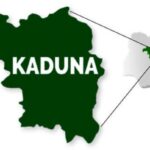Reprieve came on August 22, 2020, after almost four months of tensions, killings and maiming in parts of southern Kaduna when warring parties of Atyap, Fulani and Hausa communities came under a peace and reconciliation summit to sheathe their swords.
The Agwatyap, the paramount ruler of Atyap Chiefdom, Dominic Gambo Yahaya, had summoned a meeting of the leaders of ethnic groups within and outside the chiefdom where the summit was co-chaired by AVM Ishaya Aboi Shekari and Dr. Salim Musa Umar.
El-Rufai commends Agwatyap’s peace initiative in Zangon Kataf
Atyap, Fulani, Hausa embrace peace in Zangon Kataf
At the end of the summit which involved security agents and the local government chairman, a resolution was captured in a 14-point agreement which the representatives of Atyap, Hausa and Fulani communities signed.
Part of the resolution was condemnation of the killings, maiming and attacks on farmlands and livestock between June 11 and August 18, 2020, and an appeal to those in IDP camps to return to their homes since relative peace has been restored.
The leaders stressed that all Nigerians had the constitutional and fundamental rights to move and reside anywhere in Nigeria, including in Atyap Chiefdom without fear, molestation and harassment.
The leaders also called on civil and traditional authorities or residents of the chiefdom to facilitate the return of those who had relocated and desired to return.
However, history has shown that while signatures show the commitment of parties to any peace process, they do not guarantee peace in the long run.
Past violent incidents in southern Kaduna have proven that a single inoucous incident could mar the entire process and tear to shreds years of peace work.
Summit has tamed tensions, suspended killings
Security experts, government officials and religious leaders have endorsed the move by the warring parties, saying it had not only brought calm, but also suspended killings in the area which had in the last few months witnessed over 100 deaths.
The Commander of Operation Safe Have, Major General Chukwuemeka Okonkwo, had warned that his men would be brutal and ruthless with those who wanted to breach the peace.
General Okonkwo, however, commended the peace summit, saying it had worked in Plateau state and could work in southern Kaduna.
He said, “I am not saying the agreements will be perfectly adhered to, but all conflicts can be resolved.
“It is working in Plateau State to some extent.
“They have reached agreements in many communities.
“Once in a while it is broken, but it is resolved and Plateau and Bauchi are quiet, southern Kaduna can also be quiet.”
The Anglican Archbishop of Kaduna Province and Bishop of Wusasa Diocese, Zaria, Most Rev. Ali Buba-Lamido, while endorsing the tripartite agreement by Atyap, Fulani and Hausa, described it as a big step towards peace and reconciliation in Atyap Chiefdom and the Zango Kataf area.
Archbishop Buba-Lamido said resolutions of the peace meeting, if truly implemented, would go a long way in resolving the conflict, but stressed that community leaders, clerics and youths must team up to see to the realisation of the ideals.
He said, “It is a truism in our context that where ethnic and religious antagonisms lead to bloodshed, they are usually because politicians have inflamed passions to secure their own grip on power.”
A resident of Gora in Zangon Kataf, Ibrahim Zailani, whose family was displaced and has now moved to the Ladduga IDP Camp, said he was preparing to return after the peace summit and hoped the peace would be sustained.
Zailani said, “With increased security presence and this peace summit called by the Agwatyap, the area is relatively peaceful.”
Few days after the summit, the Agwatyap visited Governor Nasir el-Rufai to update him on the resolve of the three ethnic groups to live in peace, and El-Rufai commended his intervention in bringing together the diverse communities in his chiefdom to begin the rebuilding of trust and restoring peace.
Gov. El-Rufai described the process as a grassroots ownership of the responsibility for peace and harmony which his government had advocated, saying such initiative was beyond the deployment of police and military forces to the area.
The governor said, “This strong community rapprochement will help to complement security effort to restore law and order and advance towards sustainable peace.”
Early cracks in peace summit
Daily Trust Saturday reports that there had been several peace processes in southern Kaduna and one of the most highly accepted and well celebrated processes was the 2016 Kafanchan Peace Declaration; an accord spearheaded by the Geneva-based Centre for Humanitarian Dialogue (CHD).
Despite the optimism that greeted the Kafanchan Peace Declaration, which brought communities from six local government areas of Kachia, Sanga, Kaura, Jema’a and Zangon Kataf, the accord has since collapsed and its obliteration cemented by the burning of the Peace Apology billboard which once stood tall by a junction in Samaru-Kataf.
Therefore, for the present peace process to succeed, a security analyst, Major Muhammadu Bashir Galma (Rtd.) told Daily Trust Saturday that all parties must be sincere and make concerted effort to implement the resolutions of the peace summit.
Major Galma said, “It must be deep-hearted, otherwise it will turn to a gimmick of people coming to sit together, talk and leave.
“That has been the case in the past and that is why the peace processes failed,” and added that, “As long as there is sincerity, the peace process will succeed.”
However, a few days after the summit, cracks began to emerge; with allegations of violations of the resolutions, as well as accusations of inadequate involvement of youths in the process.
In a letter made available to our correspondent written to Gov. Nasir el-Rufai by the state Chairman of Miyetti Allah Cattle Breeders Association of Nigeria (MACBAN), Haruna Usman Tugga, the association stated that despite the peace summit, Atyap youths launched attacks on herders on August 25, at Unguwan Wakili, Kurmin Masara and Magamiya villages where many people were injured and cows stolen.
The letter reads in part: “We are surprised that despite the effort of the concerned communities in the chiefdom and the agreement signed by the three parties, the Atyap people were the first to violate the terms of the agreement that was reached at the summit which was organised by the paramount ruler of Atyap Chiefdom.”
Although the spokesperson of Southern Kaduna Peoples Union (SOKAPU), Luka Binniyat, had said the allegations could not be substantiated, he equally faulted the modalities of the peace summit where he stated that he was denied the opportunity to speak, and alleged that the Hausa and Fulani were allowed to dominate the conversation.
Binniyat had in a write-up he published, said while he was in total support of anything that would lead to normalcy in Atyap land and in the entire southern Kaduna, but wondered whether it was a consensus of the Atyap people to be in a position to negotiate peace with “those who murdered our kinsmen and plundered our villages; or are we negotiating out of sheer fear or for some unknown reasons?
“Who is detecting peace in Atyap land, the owners of the land or its settlers?
“And that’s the word they hate to hear – settlers – yet just as our people have been in Zaria from time immemorial and are still settlers, so are they too everywhere in southern Kaduna; their full constitutional rights, however, guaranteed.”
A resident of Zangon Kataf, Andrew Aminchi, said, “The peace summit is not to say there are no existing hostilities, but it is a start in the right direction, and we only hope that this will result in lasting peace.
“For the process to succeed, the youths must be the driving force.
“Is it the religious and traditional leaders that go on rampage burning houses and killing people?
“It is the youths, and they must be at the forefront of this peace process.”
For one Yusuf Usman, the youths who are the major actors and perpetrators of the crises are usually relegated during such peace processes and that what the organisers did was to call religious and traditional leaders who lived in urban areas.
Usman said, “We are not saying they are not important – because some of them are the ones instigating crises from their homes – but they do not physically act.”
He further said the sacking of district and village heads by the Kaduna State Government in 2017 also created a vacuum in the grassroots peace processes.
Our correspondent reports that the state government had sacked 313 district heads and 4,453 village heads across the state and stressed that it would only recognise 77 district heads and 1,429 village heads installed before 2001.
The government had said their overwhelming number had increased the financial burden on the state.
However, stakeholders and security analysts believe that though the state government’s action was justified, that a single act could partly contribute to the security challenges in the hinterlands.
Regarding district and village heads, Major Galma said, “There should be leadership even within ward levels. If at all there is no traditional leadership at the grassroots; it is a problem because these traditional leaders are mostly responsible for their people and settling little disputes in their domains.”

 Join Daily Trust WhatsApp Community For Quick Access To News and Happenings Around You.
Join Daily Trust WhatsApp Community For Quick Access To News and Happenings Around You.


